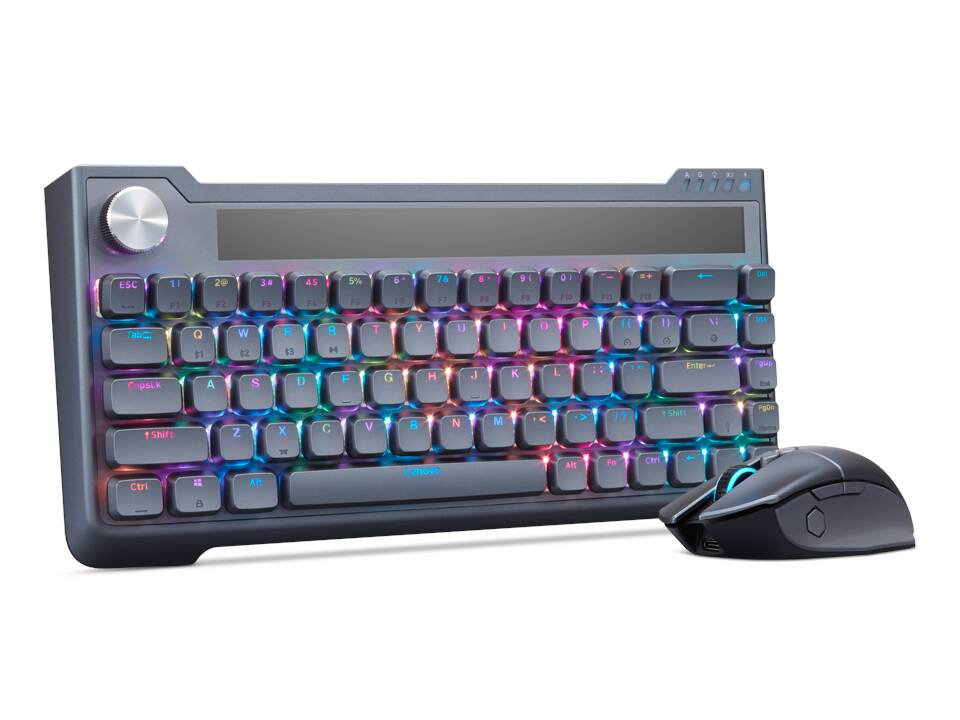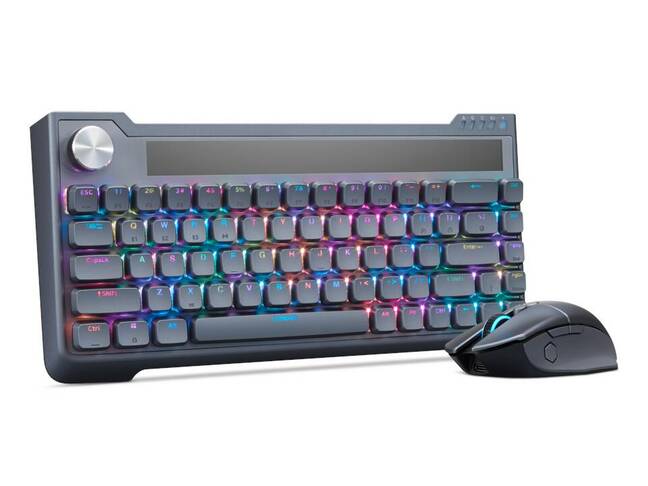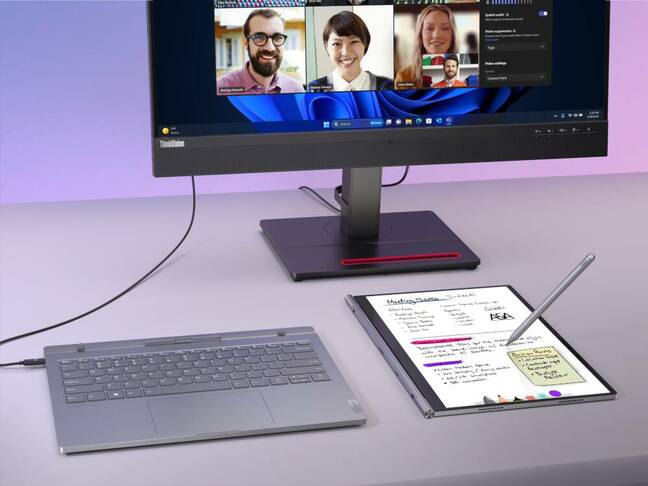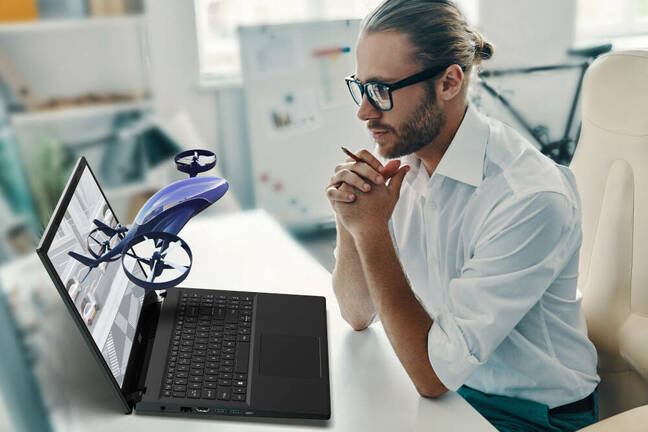It's Not All Watching Transparent TV From A Voice-commanded Bidet. CES Has Work Stuff Too

CES Where can you find a voice-controlled luxury toilet seat and a transparent television set? The annual CES show, of course, where the world's tech companies and others gather to show off the products they hope will catch the interest of buyers.
The electronics industry shindig in Las Vegas is replete with quirky products, such as those just mentioned, but also showcases upcoming kit from various industry names such as Intel and Lenovo, while this year is inevitably also heavy on AI.
Intel used CES to officially announce a complete line-up of 14th Gen desktop processors along with the Core HX and U-series mobile chips, following on from the Raptor Lake refresh last October.
The chipmaker highlighted the HX-series mobile chips, being aimed at gamers, creators and professionals, which clock speeds up to 5.8 GHz in turbo and up to 24 cores. The Core U family is designed more for thin-and-light devices, but can reach 5.4 GHz turbo frequency and feature up to 10 cores.
Intel's desktop line-up comprises 18 new processors also clocked at up to 5.8 GHz in turbo and with up to 24 cores, with support for up to 192 GB of DDR5-5600 or DDR4-3200 memory, and platform support for Wi-Fi 7 and Thunderbolt 4 ports.
Lenovo's ThinkBook Plus Gen 5 Hybrid mashes together a Windows laptop and an Android tablet. It works as a 14in Windows 11 laptop, but the screen can be detached and used separately as an Android device with an optional pen, while the base can also be used independently when connected to an external display. This is expected to be available from Q2 2024, with an expected US starting price of $1,999.
Lenovo also lifted the covers off a mouse and a keyboard it claimed is powered by the energy of mechanical movement and solar irradiation. The Mechanical Energy Harvesting Combo are described as proof of concept devices that eliminate the need for external charging, and link to a host computer by Bluetooth.
Not content, the Chinese PC maker also announced new Think systems for business, such as the ThinkCentre neo Ultra. This is a compact desktop claimed to have an easy-to-upgrade independent neural processing unit (NPU) card to back up its GeForce RTX 4060 GPU and Intel Core i9 processor, targeting smaller companies "looking to harness the capabilities of AI without heavy investments." This is set to be available from Q2 2024, with an expected US starting price of $1,499.
Lenovo used to the show to claim that its ThinkBook 13x Gen 4 is a carbon-neutral product, certified by the British Standards Institute. The 13in small business laptop has Intel Core Ultra processors and up to 32GB memory, and weighs in at 1kg (2.2 lbs) with a 12.9mm profile. It will be available this quarter, with an expected starting price of $1,399.
Taiwan's Acer said it plans to launch a laptop and a separate display that will support 3D without the need for special glasses. The company said the Aspire 3D 15 SpatialLabs Edition comes with a suite of applications for 3D viewing and content creation.
Based on a Core i7 processor and Nvidia GeForce RTX 4050 GPU, the system is said to integrate SpatialLabs' "advanced optical solutions." It is scheduled to be available in North America from February, starting at $1,400, and EMEA from March at €1,499.
- Wireless priesthood begins blessing Wi-Fi 7 hardware
- Welcome to 2024: Volkswagen really is putting ChatGPT into cars as a gabby copilot
- Nvidia gives RTX 40 series a Super refresh as AI PC hype takes off
- AMD brings its AI engines to the desktop with Ryzen 8000G APUs, RX 7600 XT graphics cards
Transparent displays were another feature at CES. LG unveiled the OLED T, a flat-screen TV with a transparent 4K 77in OLED screen. No availability date or pricing was offered, but we can all guess it won't be cheap. Samsung also showed off its new transparent MICRO LED display, claiming this will "redefine viewing experiences," but likewise gave no indication of when this will be available.
As for the voice-controlled toilet, that was the PureWash E930 Bidet Seat from a company called Kohler, which incorporates voice activation via Amazon's Alexa or Google Home. The mind boggles. ®
From Chip War To Cloud War: The Next Frontier In Global Tech Competition
The global chip war, characterized by intense competition among nations and corporations for supremacy in semiconductor ... Read more
The High Stakes Of Tech Regulation: Security Risks And Market Dynamics
The influence of tech giants in the global economy continues to grow, raising crucial questions about how to balance sec... Read more
The Tyranny Of Instagram Interiors: Why It's Time To Break Free From Algorithm-Driven Aesthetics
Instagram has become a dominant force in shaping interior design trends, offering a seemingly endless stream of inspirat... Read more
The Data Crunch In AI: Strategies For Sustainability
Exploring solutions to the imminent exhaustion of internet data for AI training.As the artificial intelligence (AI) indu... Read more
Google Abandons Four-Year Effort To Remove Cookies From Chrome Browser
After four years of dedicated effort, Google has decided to abandon its plan to remove third-party cookies from its Chro... Read more
LinkedIn Embraces AI And Gamification To Drive User Engagement And Revenue
In an effort to tackle slowing revenue growth and enhance user engagement, LinkedIn is turning to artificial intelligenc... Read more




